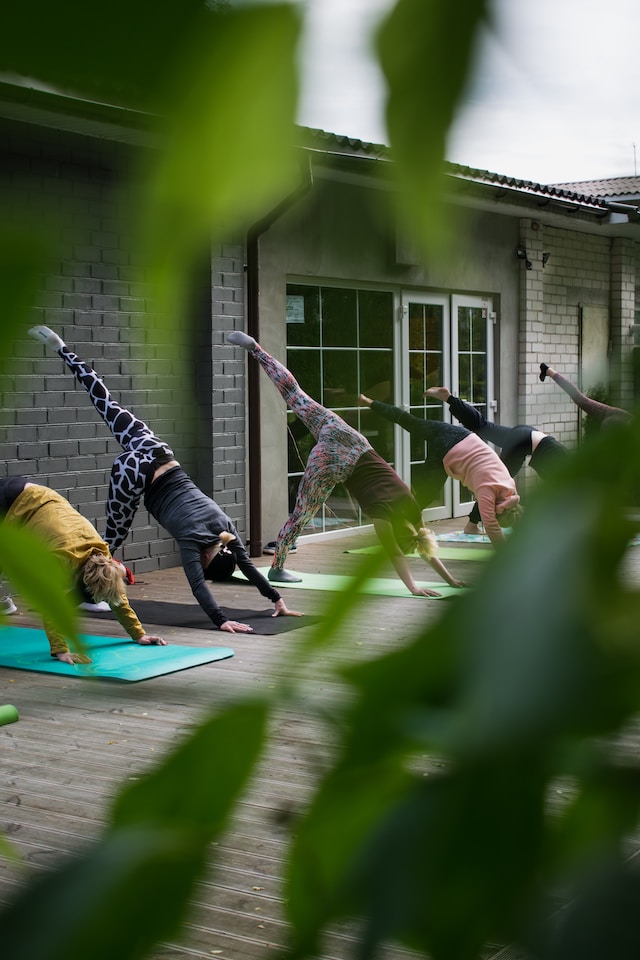(Goals Beyond Weight-Loss)
In the fitness sector, it seems like weight loss is the only prominent goal that everyone is achieving. However, obsessing about how much you weigh on the scale may be frustrating and not good for your mental health. A narrow focus can cause you to ignore essential aspects of your overall wellness.
There are alternatives to concentrating on a number. Achieving total-wellness in my life is a principle I regularly practice. I find it important for me to write, meditate, pray, eat healthy, exercise, and be creative on the daily. These things bring unexpected joy, assist in my personal growth, and provide balance. In this article, I would like to share a few suggestions that you may be able to adopt in your life. Take a look. If anything resonates with you, take action on it. Making small behavioral changes when you can equates to a healthy work and lifestyle balance.
Your wellness goals should be to improve yourself overall. This includes the mind, body, and soul. Behavioral changes in small ways can have a significant impact on improving health and emotional wellbeing. After all, establishing good and long-term health necessitates a wide range of health-promoting behaviors.
Making changes, on the other hand, is not easy. You’ve been doing things a certain way for a long time, and your go-to tools are most likely ones you’ve acquired along the way. They may have worked in the past, but adjustments are sometimes essential for positive advancement.
Let’s Get Started…
Now that you’ve decided to create wellness goals, it’s time to pick what you want to focus on. Because it takes an average of 66 days to form a new habit, you should allow yourself plenty of time and resources to ensure your success.
To help you create your objectives, use the SMART criteria: precise, measurable, achievable, realistic, and timely. Instead of stating, “I’m going to sleep more,” try saying, “I’m going to bed half an hour earlier 5 days a week for the next consecutive 4 weeks.” The more explicit your goals, the more likely they are to be met.
Speaking with a healthcare practitioner, coach, personal trainer, or professional nutritionist may assist you in defining suitable objectives and developing action plans to achieve them.

Set Non-Exercise Activity Goals
Increased physical activity through organized exercise is not necessary. Non-exercise activity refers to any activity or movement that does not involve sport or exercise.
Doing more physical work for oneself is not only good for your mind, but it also helps your physical health. This is known as NEAT (non-exercise activity thermogenesis). NEAT may help you stay active so that a healthy level of physical fitness is maintained. By doing simple tasks like cleaning or decluttering, both are tasks that enhance your quality of life, reduce stress, clean your environment, and makes you feel happy.
Non-Exercise Activity Goals:
Take the stairs instead of the elevator at work.
Hand-wash your car once a week.
Instead of emailing or contacting a coworker, go over to their desk.
Increase your standing time. Consider utilizing a standing desk or simply standing while doing tasks you would typically do seated.
Walk or ride your bike to get around.
Have fun with your kids.
Perform some yard work or house cleaning.
Make an active family excursion once a week or as often as possible, such as hiking, bicycling, kayaking, paddle boarding, or building an obstacle course.
Sleep should be prioritized.
Nobody appreciates not getting enough sleep. Sleep deprivation not only makes you feel sluggish and tired throughout the day, but it also contributes significantly to stress, lower quality of life, mental discomfort, pain, weight gain, mood disorders, and other chronic health problems.
It is not an easy option to enhance your sleep hygiene. Let’s face it: sometimes you can’t sleep because of situations beyond your control. Prioritizing sleep is certainly worth the effort if you feel you can do it or if you have some leeway.
Among the benefits of obtaining more sleep are:
Hormone regulation
Metabolic regulation
Better mood and cognitive function
Immune system wellness
To prioritize sleep, first set a goal and then plan how to attain it. “For example, I will turn off screens an hour before bedtime and go to bed 20 minutes earlier five days a week.” The next step is to put your strategy into action.

Make time for media breaks.
Don’t you just love it when your phone or tablet reminds you how many hours and minutes you’ve spent on it today? Devices may be addictive, and our screen time frequently reflects this.
While social networking has certain advantages, it may also generate a great deal of tension and concern. Taking a break to relax and reset one’s thoughts is not just a good idea; it has also been demonstrated to boost one’s well-being and sleep.
It does not have to be a long period of time away from social media in order to be useful. Even a one-week sabbatical can result in significant improvements in well-being, despair, and anxiety.
Allow yourself a much-needed break so that you can return ready to enjoy the benefits of online socialization.

Create a Creative Outlet
With so many responsibilities to fulfill in a single day, it’s easy to feel as if finding time for hobbies is impossible. So, if you can’t find the time, create it yourself.
Having hobbies that you like, such as painting, manufacturing, and crafting, might help you live longer, according to experts.
Developing a creative outlet is also good to your mental health, especially when done in a social setting. According to a 2015 study, people who participated in leisure activities had higher mental health than those who just participated in social activities. Mental health improved when the two were combined—leisure activities in a group environment or with a buddy.
Making time to cultivate a creative outlet is an excellent way to support your well-being.

Practice Mindfulness
Everyone has felt like they were just going through the motions at some point in their lives. It’s easy to become overwhelmed and zone out during regular tasks. Being deliberate and mindful throughout the day has a way of grounding and grounding you.
Researchers revealed that the advantages of mindfulness go beyond intention and contribute to your psychological well-being.
One way to stay present is to concentrate on what you’re doing. Pay attention to your arm movements and breathing patterns; straighten your upper body, press your shoulders back, or sit comfortably. Concentrate on relaxing and letting go of tension. Be patient and have an open mind. It is your job to provide evidence of your own actions and experiences.
Contribute to a Good Cause or Volunteer
Finding meaning in life may have a big influence on your health. Experts have determined that volunteering to help others, whether you are passionate about a particular cause or enjoy helping others, is an excellent approach for improving health and quality of life.
It doesn’t have to be a huge thing; every little bit helps. Begin by considering how you would like to give back. To get you started, here are a handful more ideas:
Most 5Ks benefit a worthy cause, so join up and get started!
Volunteer in your town at a food bank or an animal shelter.
Assist in your child’s classroom or school.
Contribute a book
Organize a small fundraiser, such as a raffle, and donate the proceeds to a deserving organization.

Encourage Interactions with Others
Making new friends is challenging. That is beyond a doubt. It might be far more difficult to make friends as an adult. Fostering social ties does more than simply provide you with someone to hang out with—it also benefits your general health! Spending time with people you enjoy might improve your mood and general health.
Studies have shown that short-term and long-term social connections lessen the risk of cardiovascular disease, cancer, impaired immunological function, and depressive symptoms. Furthermore, the effects of loneliness and social isolation may be detrimental. Researchers have even linked it to obesity, smoking, alcohol usage, and a lack of physical activity.
Clinicians and researchers recommend making a daily or weekly effort to interact with family, friends, and others. Once a week is a reasonable starting point and may be more manageable for individuals with busy schedules.
Here are some ideas for discovering like-minded people in your area:
Take part in a group or club.
Consider enrolling in a fitness class.
Volunteer
Join a social organization.
Look for community activities in your area.
Increase the amount of time you spend outside.
More than just a great tan, the sun and cold air on your face may be beneficial. In fact, even looking out the window can enhance your mood.
Getting outside more regularly provides both therapeutic and mental health benefits. It has been shown that living and working near green spaces reduces stress, sadness, and anxiety.
Spending time outside will benefit you even if you live in the city.
Begin by establishing a sensible goal—it might be anything little. Going for a ten minute walk during your lunch break five days a week, or going for a walk after dinner three nights a week, are also wonderful places to start.
Check out these ways to enjoy the great outdoors:
Explore on a bike or take a stroll.
Relax and read a book under a tree.
Take the time to go to the park or beach.
Take a child to the zoo.
Park farther away from your destination.
Please provide food for the ducks.
Go on a fishing excursion.
Look up every once in a while, to enjoy the stars or the clouds.

The Final Two Cents
It is a marathon, not a sprint, to achieve health improvement goals. While getting on the scale is perhaps the most popular way to gauge success, it is not always the greatest. More fulfillment should rest on total-wellness rather than a sole focus on weight-loss goals. Doing so can enhance your happiness by being pleased in various areas of life taking the pressure off of being perfectly fit.
Change does not happen overnight. Consider speaking with a healthcare practitioner, counselor, or registered dietitian to help with setting realistic goals that are right for you and your lifestyle.
